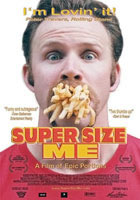
Director: Morgan Spurlock
Duration: 100 minutes
Year: 2004
Key Words: Nutrition, fast food, obesity
Summary: Director Morgan Spurlock explores aspects of the obesity problem in America. He goes on a MacDonald's fast food diet for a month to the detriment of his health.
Degree of public health theme coverage: The main theme of this documentary-style movie is actually a public health one: the role of fast food (particularly McDonalds) in the US obesity epidemic and in poor nutrition. The topic is also an example of how corporate power (McDonalds and the Grocery Manufacturers of America (GMA)) impact on a public health issue. The inactions of the US Federal Government are suggested in that the Congress is reported to have made it illegal to sue fast food companies. Score=5/5
Sophistication of analysis of public health content: There is a lot of background information on obesity trends (including maps). There are also many expert commentators interviewed: key authors and nutrition experts (eg, Marion Nestle), key public health people (ex-Surgeon General Satcher) also legal experts and commentators representing various NGOs. Also a person representing the GMA – who admitted that the food industry was part of the problem. The 3 doctors plus a nutritionist who are monitoring Morgan Spurlock (the director) provide some depth of comment on his deteriorating health (eg, deteriorating liver function based on test results). The stunt of just eating McDonalds for 30 day does appear to impact on the Spurlock's health (increased weight, increased cholesterol, subjective reports of poor health). Score=4/5
Potential for empowerment and use of advocacy: The movie as an advocacy phenomenon in itself was remarkably successful in that six weeks after its release, McDonalds apparently stopped its “supersize” portions. The movie explores some case studies of schools that just serve 'healthy food' and have banned soda etc. By exploring the problem in quite a comprehensive way some plausible solutions are hinted at eg, improving restrictions on corporate power. But at the end Spurlock does not actually focus on the need for regulatory changes to control the obesogenic environment. Instead he refers to individual responses to not eating this type of food (which might be regarded as a very limited approach from a public health perspective). Other 'stunt-like' investigations included:
- Showing children pictures of people and asking about recognition (Jesus vs Ronald McDonald).
- Surveying McDonalds in Manhattan to see if nutrition information is available.
Score=4/5
Persuasiveness of the movie: The documentary style, the data presented and the interviews with experts make the movie fairly persuasive. The frequent photos and interviews of obese adults and children suggest that America definitely has an obesity problem. The 'stunt' of eating only McDonalds is fairly persuasive that this is not a healthy activity. Some arguments are not that well developed eg, the fairly limited scope of increased physical activity in controlling the obesity epidemic (ie, given how much physical activity is required to expend the energy contained in most foods). Also the arguments around the “addictive” nature of some foods may seem rather weak to some people. Score=4/5
Engagement & cinematic quality: The movie is very engaging and fast paced. It is quite funny at times – but also very graphic (eg, surgery for obesity, vomit from a McDonalds meal etc). There is very good use of graphics (eg, maps of obesity in the USA etc). The selection of interviewees is broad and works well. The inclusion of Spurlock's girlfriend (a vegan chef) provides an interesting counter-point – with her carefully prepared, healthy and attractive meals. Score=5/5
Total score=22/25
Questions for discussion:
- From the issues raised in this movie, what type of regulatory action can governments usefully undertake to help control the obesity epidemic?
- Was eating just McDonalds for 30 days a very clever advocacy stunt or was it rather silly and bizarre?
Other information:
- The DVD has extra scenes that may be of interest to viewers
- There is a Wikipedia article on this movie - found here (this article also includes criticism of the move)
- The trailer can be seen on YouTube - found here
- Back to Films in Undergraduate Public Health Teaching home page
CONTACT US
Associate Professor Nick Wilson
Department of Public Health
University of Otago, Wellington
PO Box 7343
Wellington South 6242
New Zealand
Tel: +64 4 385 5541 ext 6469
Fax: +64 4 389 5319
Email: nick.wilson@otago.ac.nz